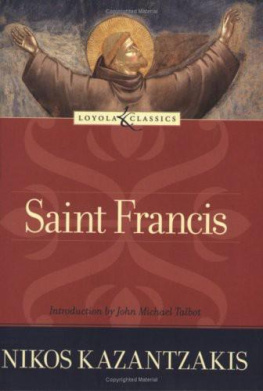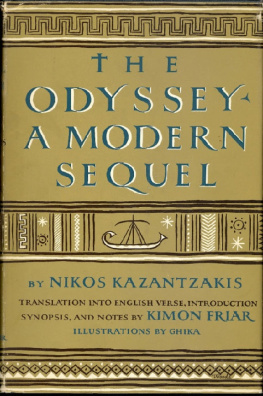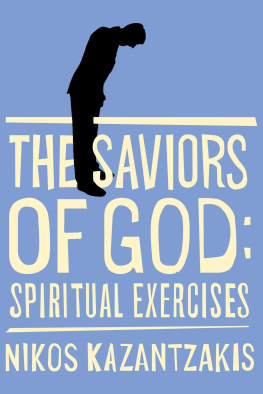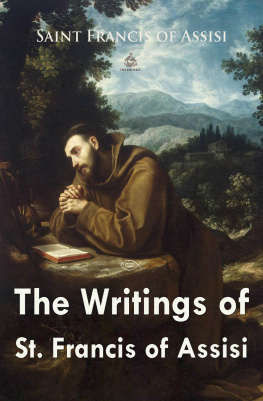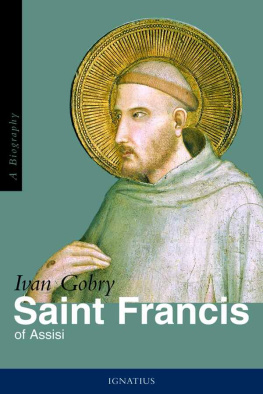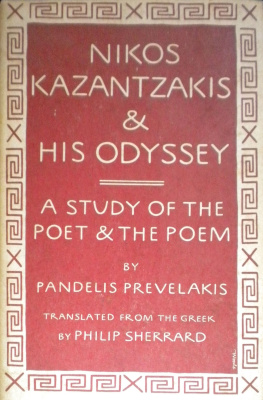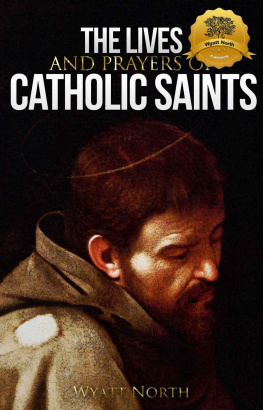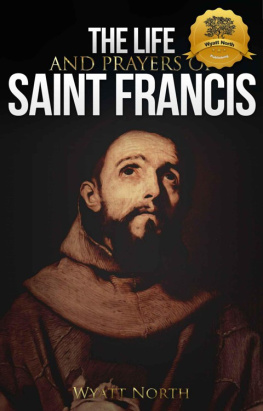SAINT FRANCISNikos Kazantzakis
Translated from the Greek by
P. A. Bien
Dedicated to
the Saint Francis of our era,
Dr. Albert Schweitzer
N.K.
PROLOGUE
If I have omitted many of Francis" sayings and deeds andif I have altered others, and added still others which did nottake place but which might have taken place, I have done sonot out of ignorance or impudence or irreverence, but from aneed to match the Saint's life with his myth, bringing that lifeas fully into accord with its essence as possible.
Art has this right, and not only the right but the duty tosubject everything to the essence. It feeds upon the story,then assimilates it slowly, cunningly, and turns it into alegend.
While writing this legend which is truer than truth itself, Iwas overwhelmed by love, reverence, and admiration forFrancis, the hero and great martyr. Often large teardropssmeared the manuscript; often a hand hovered before me inthe air, a hand with an eternally renewed wound: someoneseemed to have driven a nail through it, seemed to be drivinga nail through it for all eternity.
Everywhere about me, as I wrote, I sensed the Saint'sinvisible presence; because for me Saint Francis is the modelof the dutiful man, the man who by means of ceaseless,supremely cruel struggle succeeds in fulfilling our highestobligation, something higher even than morality or truth orbeauty: the obligation to transubstantiate the matter whichGod entrusted to us, and turn it into spirit.
FATHER FRANCIS, I who take up my pen today to write your life and times, unworthy that I am: when you first met me, remember, I was a humble beggar, ugly, my face and head covered with hair. From the eyebrows to the nape of the neck I was nothing but hair. My eyes were frightened and nave; I stuttered, bleated like a lamband you, in order to ridicule my ugliness and abasement, you named me Brother Leo, the lion! But when I told you my life story you began to weep; you clasped me in your arms, kissed me, and said,
"Brother Leo, forgive me. I called you 'lion' to ridicule you, but now I see that you are a true lion, because only a lion has the courage to pursue what you are pursuing."
I had been going from monastery to monastery, from village to village, wilderness to wilderness, searching for God. I did not marry, did not have children, because I was searching for God. I would hold a slice of bread in one hand and a fistful of olives in the other, and though I was famished, I always forgot to eat, because I was searching for God.
I walked so much that my feet became swollen; I asked the same question over and over again until hair sprouted on my tongue! Finally I grew tired of knocking on doors and holding out my hand, first to beg for bread, then for a kind word, and after that for salvation. Everyone laughed, called me a visionary, and chased me awaypushed me until I arrived finally at the edge of the abyss. I was weary; I began to blaspheme. I'm human after all, I said; I'm tired of walking, of going about hungry and cold, of knocking on the gates of heaven and seeing them remain closed. And then, as I was on the verge of despair, one night God took me by the hand; He took you by the hand also, Father Francis, and brought us together.
Now I sit in my cell and watch the springtime clouds through my tiny window. Below in the courtyard of the monastery the heavens have descended: there is a fine drizzle, and the soil is fragrant. The lemon trees in the orchards have blossomed; in the distance a cuckoo calls. All the leaves are laughing: God has become rain and is raining on the world. O Lord, what joy! What happiness! Look how earth, rain, and the odors of dung and the lemon trees all combine and become one with man's heart! Truly, man is soil. That is why he, like the soil, enjoys the calm caressing rains of spring so very much. My heart is being watered. It cracks open, sends forth a shootand you, Father Francis, appear.
All the soil inside me has blossomed, Father Francis.
Memories rise up, time rolls back its wheel, and there, brought back to life, are the sacred hours we spent journeying together over the face of the earth, you in front and I following timorously in your footsteps. Do you remember where we first met? I was so hungry that night, I staggered as I entered the celebrated city of Assisi. It was August and the moon was immense. I had already enjoyed this noble city many times, glory be to God, but that night Assisi was something else entirely: it was unrecognizable. What miracle was this? Where was I? Houses, citadel, churches, towers: all were hovering in the air, floating in a pure white sea, beneath a purple sky. It was dinnertime when I entered the city through the newly built Saint Peter's Gate. The moon was just risingfull, brilliantly red. It was gentle, like a kindly sun; and from high up on the citadel, the Rocca, a serene waterfall spilled down onto the bell towers and housetops, filling the ditches with milk until they overflowed, flooding the narrow lanes, which ran like brooks, and making the faces of the inhabitants so radiant that everyone seemed to be thinking of God. I stopped, swept away by the sight before me. Is this Assisi? I kept asking myself, making the sign of the cross. Can these be houses and people and bell towers, or is it possible that, while still alive, I have entered Paradise? I held out my hands; the moon filled my palms, a moon sweet and gelatinous, like honey. I felt the grace of God running over my lips, my templesand then I understood. I uttered a cry. Some saintyes, without a doubt some saint had come this way. His smell was in the air!
Sloshing through the moonlight, I climbed the twisting lanes until I reached the Piazza San Giorgio. It was Saturday night and a large crowd had gathered. There was singing and raucous shouting, mixed with the sound of mandolins and the intoxicating aroma of fried fish, jasmine, rose, and cabobs sizzling on the coals. My hunger increased beyond bounds.
"Hey, good Christians," I called, approaching one of the groups of celebrants, "who in this renowned city of Assisi can give me alms? I just want to eat, sleep, and then leave in the morning."
They looked me over from head to toe, and laughed.
"And who do you think you are, my beauty?" they answered, guffawing. "Come closer and let us admire you."
"Maybe I'm Christ," I said to frighten them. "Sometimes He appears on earth like this, like a beggar."
"You had better not repeat that, not if you know what's good for you, poor fellow," one of them said. "We won't have anyone spoiling our party. Quick now, move on! Otherwise we might rise up, every single one of us, and crucify you!"
They laughed again; but then one, the youngest of the group, felt sorry for me.
"Pietro Bernardone's son Francis, old 'Leaky Palms': he's the one who'll give you alms. And you're in luck. Yesterday he returned from Spoleto with his tail between his legs. Go and find him."
At that point an ugly, gawky giant jumped forward. He had a mouselike face, a jaundiced complexion, and was called Sabbatino. We met again a few years later when he too became one of Francis' disciples and, barefooted, we journeyed together over the roads of the world. On this night, however, the sound of Francis' name made him cackle maliciously:
"Why do you think he went to fight at Spoleto, all fitted out in his gold and plumes? It seems he wanted to do great deeds, have himself invested as a knight and then come back here to play cock of the walk. But the Almighty knows what's what. He gave him a bang square on the head, and our proud rooster returned home with his feathers plucked."
Next page 
